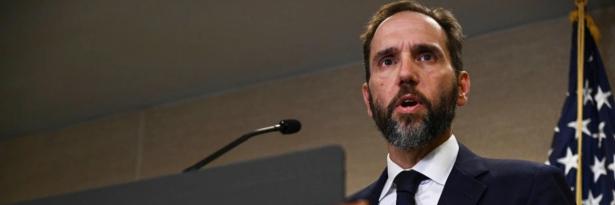Special Counsel Jack Smith's announcement on Monday that he was dropping his case regarding President-elect Donald Trump's alleged handling of classified documents and election subversion was not unexpected, as U.S. Justice Department policy dictates that a sitting president can't be prosecuted while in office.
But government watchdogs said the developing was no less "troubling," and vowed that Trump must ultimately face accountability.
"At least for now, Trump may escape justice for his role in trying to overturn the 2020 election, fomenting the January 6 insurrection, and improperly handling classified documents," said Lisa Gilbert, co-president of Public Citizen. "But his ability to escape prosecution does not retroactively validate his illegal, unconstitutional and democracy-destroying activities. They were heinous and unconscionable acts that literally cost lives and threatened the peaceful transfer of power."
"If not the courts, history will judge them appropriately," said Gilbert.
In his motion to dismiss the case, filed in the U.S. District Court for the District of Columbia, Smith wrote that "the government's position on the merits of the defendant's prosecution has not changed. But the circumstances have."
" Donald Trump aims not just to excuse but to normalize all this behavior. Permitting him to succeed would enable a slide into authoritarianism. The American people must not let that happen."
Former Labor Secretary Robert Reich wrote in his Substack newsletter that regardless of DOJ policy, the filing was "a grave mistake," because Smith did not specify that the prosecution of Trump would be restarted after the president-elect leaves office.
"Smith says he had no choice," wrote Reich. "But he did have a choice. He could have asked the courts to put the cases on hold until Trump is no longer president... To be sure, Smith's requests were for dismissals 'without prejudice,' which technically leaves open the possibility that charges could be refiled after Trump leaves office. But refiling charges is vastly more cumbersome than simply ending a stay."
While Smith left the door open to once again bring charges against Trump in 2029, he "should have put the responsibility for avoiding the rule of law squarely on Trump," wrote Reich.
Legal analyst Barb McQuade added that Smith's tactic leaves the possibility that "there may be no appetite" to refile charges regarding eight-year-old allegations after Trump leaves office.
At Slate, Dahlia Lithwick and Mark Joseph Stern wrote that Attorney General Merrick Garland's "institutionalist instincts paralyzed the Justice Department for nearly two years, giving Trump a chance to run out the clock by the time Smith finally indicted him."
The attorney general is "partly at fault for waiting so long to commence the investigation into Jan. 6," they wrote, while right-wing federal Judge Aileen Cannon "is guilty of sabotaging" the case regarding Trump's retention of classified documents after he left office in 2021, which Cannon dismissed in July, claiming Smith's appointment as special counsel violated the Constitution.
"In a simplistic sense, the voting public also bears culpability for putting Trump back in the Oval Office despite his egregious attempts to steal the previous election. But that victory could not have happened without the Supreme Court, which essentially nullified the constitutional bar against insurrectionists returning to office, then awarded Trump sweeping immunity in Smith's Jan. 6 case. The court's immunity decision guaranteed that the former president would not face trial before the election, which in turn prevented the public from hearing the full range of evidence against him."
Gilbert emphasized that "at Public Citizen we believe that no one should be above the law, that criminality by the powerful must be punished, and that attempting to overturn the nation's election and fomenting political violence should be harshly sanctioned."
"Donald Trump aims not just to excuse but to normalize all this behavior," said Gilbert. "Permitting him to succeed would enable a slide into authoritarianism. The American people must not let that happen."
===
Julia Conley is a staff writer for Common Dreams.


Spread the word